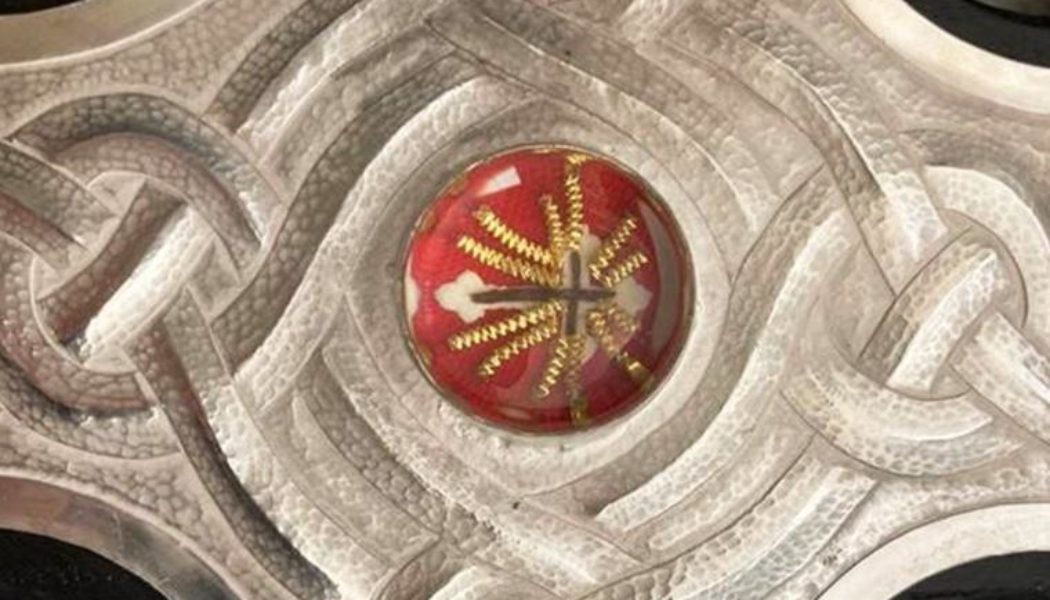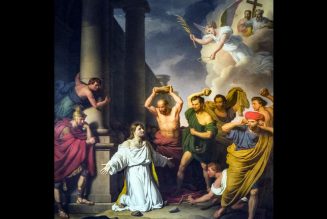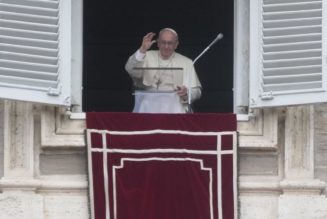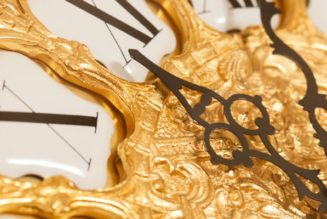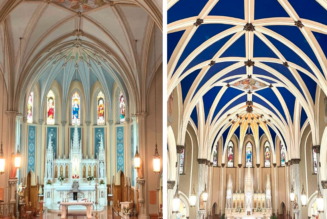
COMMENTARY: In today’s Britain, Christian ceremony and tradition still has its place.
The flags are up in the main streets of cities around Britain, and groups of enthusiasts in suburbs and villages around the country are planning street parties. Shops are selling souvenirs: tins of tea and of shortbread bearing pictures of King Charles III, packets of small flags to wave, paper crowns, commemorative mugs, tankards, tea towels and more. We will have special prayers at Mass during coronation weekend and at the main Masses probably also the national anthem.
The trimmings of the coronation are all there: Huge crowds will be lining the route to Westminster Abbey for the ceremony. I plan to be among them, with a team of friends and family, a picnic basket, foldaway chairs and an umbrella, just as I was back last June for the Platinum Jubilee of the late Queen Elizabeth II.
And there are some moving and powerful aspects to the coronation that have a significance far beyond their immediate interest.
Pope Francis has sent two fragments of the True Cross to the king, and these, embedded in a silver processional cross specially made in Wales, will be carried in procession at the start of the Westminster Abbey ceremony on May 6. This is an extremely important and historic gift from Rome, a powerful moment in our history.
Talk of the ceremony being “multifaith” is somewhat wide of the mark. Certainly, representatives of Britain’s Muslim, Sikh and Hindu people will be present in prominent seats and invited to greet the king, but the prayers, anointing and crowning will all certainly be specifically Christian and identical to those used in coronations of past centuries.
Something that has been much overlooked is that anti-Catholic aspects of the ceremony, introduced in the 17th century, have now been abandoned. In 1901 when King Edward VII was crowned, he was obliged to repeat an oath specifically denouncing the doctrine of transubstantiation. He disliked it and deliberately spoke it in a very low voice so as not to hurt the feelings of his Catholic subjects. It was the last time the oath was used; with the next king, George V, it was abandoned. King Charles III will simply promise to uphold the teachings of the Church of England and will add something about defending religious freedom generally. And there will be formal Catholic participation in the service, most probably with the cardinal-archbishop of Westminster reading a prayer, as he did at the queen’s last September.
The media has been highlighting memories of the previous coronation, held in the middle of the last century. There are still many older people who remember it well: Few families had televisions in those days, so neighbors gathered together to watch, crowding around tiny screens with black-and-white pictures and then enjoying sandwiches and cakes, with butter and sugar only recently released from wartime rationing.
Cardinal Vincent Nichols of Westminster summed up the memories of so many in June 2022:
“How well I remember the Coronation mug and the bar of chocolate in its decorated tin box that I received, along with every child, on the day of Her Majesty’s Coronation. It was also the first time that I watched a television!”
1953 does seem a very long time ago. When Queen Elizabeth II was crowned, this was a united country that had endured two grim wars and where people were deeply conscious of a shared history with records going back more than 1,000 years. Most children were born into married families. It was normal to attend a local church, and all schools began each day with Christian prayers and hymns. Foreign travel was rare. A coronation resonated with concepts familiar to most people: Christianity, formality, traditions, a sense of structure to community life.
Today, it is easy for lobby groups to tap into a national mood that reflects a sense of confusion about who we are and what values we are meant to share. As I walked through a northern city the other day, the coronation flags hung in streets that also carried, as a matter of routine, rainbow stripes on steps at various points, placed there by the public authorities for the summer’s annual “Pride” events. Advertisements and shop displays tend to reflect every sort of lifestyle except that of a married man and woman with children. Media stories highlight the debates over gender: a teacher made to apologize for saying, “Good morning, girls” to her pupils at an all-girls school; members of the Royal Air Force told they can each choose whether to wear a male or a female uniform.
Where does the coronation fit into this? It has the capacity to bring us all together and to introduce Christian ceremony into the lives of people wholly unfamiliar with it. There will also be marching and bands, a display of the military traditions for which Britain is so famous and of which we are justly proud.
But an extremist anti-royal group has announced plans to disrupt the day, using tactics already familiar, through animal-rights campaigners. And how much do most of our young people understand about the true value of our constitutional monarchy, of the role it plays in ensuring a place for nonpolitical patriotism, a sense of community, a cherishing of the best of our heritage and traditions? History is very badly taught in most schools today, for fear of failing to follow currently fashionable ideas on all sorts of things ranging from sexual difference to industrialisation, empire and our relationship with animals.
And will most of those watching on TV be familiar with the Lord’s Prayer or with the Scripture readings? And where does the Church of England, which has just voted to allow blessings for same-sex couples, fit into our national life today?
Many years ago, I met Prince Charles at an ecumenical event chaired by a Catholic lady who gathered younger people together to talk to him. I remember him as genuinely interested, engaged and frank. He used the traditional “Our Lord” when referring to Christ and spoke as one reasonably informed about the Christian faith and certainly at ease in discussing it. He has the prayers of many of us upon his anointing in Westminster Abbey.
God save the King!
